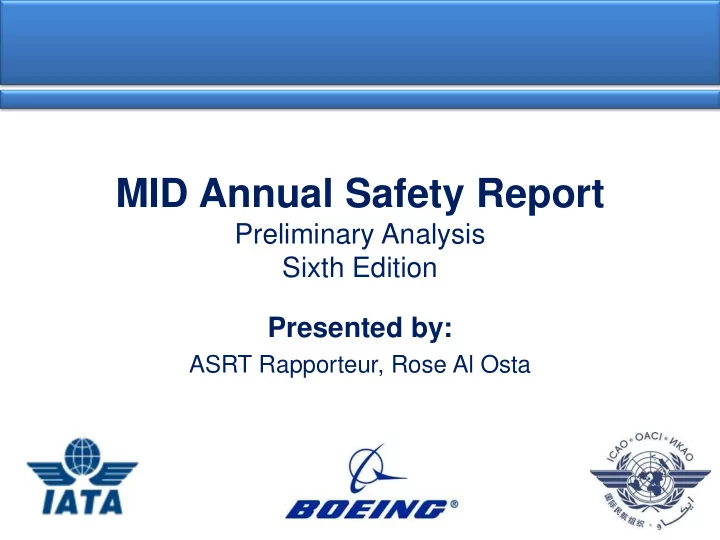

MID Annual Safety Report Preliminary Analysis Sixth Edition Presented by: ASRT Rapporteur, Rose Al Osta
Objectives of ASRT • Gathering safety information • Identification of safety focus areas • Production the annual safety report 1 st Edition, Nov 2012 2 nd Edition, Jan 2014 3 rd Edition, March 2015 4 th Edition, May 2016 5 th Edition, Jan 2017 6 th Edition, In progress
Data Collection & Sources Methodology • Existing safety databases of different aviation stakeholders • Surveys • Experts opinion • Industry meetings Data sources for ASR (6 th edition)
ASR Content (6 th edition) RASG-MID uses different types of safety information PREDICTIVE SSP/SMS implementation and PROACTIVE analysis of FOQA Safety audit results de-identified data - an area for and incident REACTIVE improvement! reports Accidents and serious incidents
Safety Data Analysis Risk assessment based on: Frequency Severity (fatality) Accident Frequency * category # accidents Frequency Severity Severity RS 8 1 3 3 SCF 3 2 2 4 OTH 2 3 N/A N/A UNK 2 3 N/A N/A TURB 1 4 3 12
Reactive Safety Analysis – Accident rates Accident rate Scheduled Commercial above 5700kg 5 • Reduced 4.3 accident rate 4.5 for 2016 4 compared to 3.5 3.1 2015 3 Accidents pr Mil Dept 2.8 2.8 2.8 3 • Above global 2.3 2.5 rate in 2016 1.9 2.5 2 • Matched 5 yr 2.1 1.5 average global rate! (avg global 1 = 2.8) 0.5 0 2012 2013 2014 2015 2016 MID accident rate Global accident rate
Reactive Safety Analysis – Fatal Accidents • Accident rate Fatal Accidents for MID fatal Scheduled Commercial above 5700kg accidents 12 11 (2012-2016) is 0.64 10 8 • Above global 8 7 9 accident rate # Fatal Accidents 6 for World fatal 6 accidents (2012 – 2016) 4 which is 0.26 2 2 1 • Fatalities in 0 0 2014 = 38 1 0 2015 = 224 2012 2013 2014 2015 2016 MID fatal accidents Global fatal accidents 2016 = 67
Reactive Safety Analysis • Top contributing factors Safety management Regulatory oversight Airport facilities (Poor/faint marking signs) Flight crew errors related to manual handling/ flight controls Contained engine failure/ Power plant malfunction
Proactive Safety Analysis - USOAP 13 out of 15 States have been audited Overall MID EI = 70.11% which is above Global average (64.71%) 5 states are below 60% (Libya, Syria, Egypt, Jordan & Kuwait)
Proactive Safety Analysis - USOAP 8 areas and 6 critical elements are above the target of 60% Critical elements CE4 (Qualified technical personnel), and CE8 (Resolution of Safety issues) are the lowest in terms of EI (below 60%)
Proactive Safety Analysis - IOSA All MID accidents rate among non-IOSA registered operators was above the world average by an average of 8.55 (2012-2016) 27 audits were performed in the MENA Region with an average of 5.8 findings per audit. Findings were mainly in the areas of: Maintenance (MNT), Flight Operations (FLT), Organization Management (ORG), Ground Handling Operations (GRH), Cabin Safety (CAB)
Proactive Safety Analysis - ISAGO • 15 audits in 2016 (5 initial and 10 renewals) • Majority of findings were in the areas of: Organization & Management Aircraft Handling & Control (HDL) ISAGO AUDIT FINDINGS PER AREA - MENA PAB HDL 3% 16% ORM - S LOD 26% 3% ORM - H 3% ORM - HS 49%
Proactive Safety Analysis - Incidents • Bird Strikes – an increasing trend!
Proactive Safety Analysis - Incidents • Deep landing – an increasing trend!
Proactive Safety Analysis - Incidents • Engine Stall – an increasing trend!
Predictive Safety Analysis • STEADES utilized for trending purposes to analyze top contributing factors that would result in accidents EGPWS/GPWS warning – a decreasing trend in 2016 Stall warning – no trend identified (higher MID incident rates) TCAS RA – no trend identified (higher MID incident rates) Unstable approaches – an increasing trend in 2016
Focus Areas & Emerging Risks • Focus Areas for MID region for 2018 (based on 2012-2016 period) Runway Safety (RS) System/ Component Failure (SCF) • Regional emerging risks: Loss of Control In Flight (LOC-I) Controlled Flight Into Terrain (CFIT) RPAS/Drones Wildlife & FOD Laser attacks
Thank you!
Recommend
More recommend